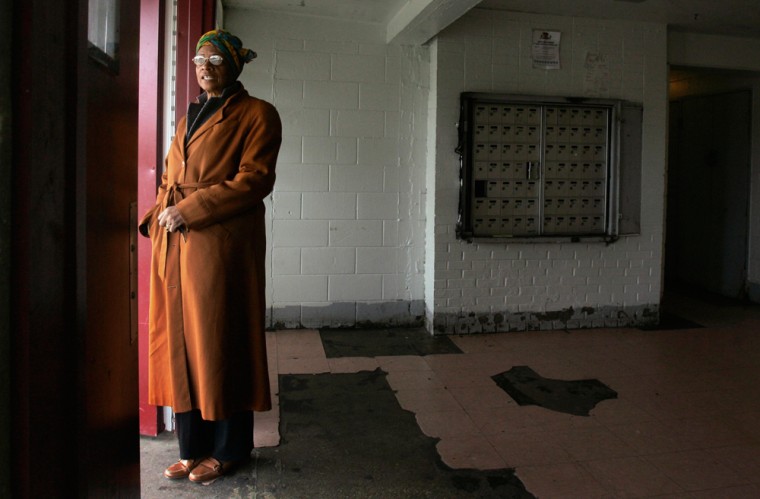Jacqueline Thompson has lived in the public housing projects for nearly half a century and can't remember ever seeing this many police officers around before.
From her third-floor window, she watches as they routinely pile out of squad cars, slap cuffs on young black men and take them away. Like other tenants, Thompson believes there's a simple explanation: money.
She and others suspect police are hassling tenants in a plot by City Hall to empty out the projects and redevelop the land.
Already, they see how trendy restaurants, townhouses and million-dollar condos are replacing the empty lots and run-down warehouses outside the project gates, and how the city is sprucing up in a bid to land the 2016 Olympics.
"It's awfully suspicious that after all these years, this is what's occurring," said Thompson, who writes for Residents Journal, a publication for and by Chicago Housing Authority tenants. "What other reason is there to be so hard on people?"
Chicago officials deny there is a concerted effort to force tenants from the Harold Ickes Homes, where Thompson lives. Police acknowledge cracking down at Ickes, but say it is only to stem crime.
"I have no idea what plans the CHA or the city has with any kind of property because that's not my domain," said Deputy Police Chief James Keating. "My mission is to ensure the safety of the citizens that live in that community."
Nevertheless, it's a long-held suspicion by public housing tenants nationwide that police harass them, arrest their visitors and target their homes as part of a larger effort the Rev. Jesse Jackson calls "urban removal."
D.C. poor call it 'The Plan'
In Washington, suspicions of an organized effort by whites to let neighborhoods deteriorate and then come back and grab them for next to nothing are so widespread that the poor there have a name for it: The Plan.
"It's the same in every city in America to a greater or lesser extent," said Michael Beyard at the Urban Land Institute in Washington. "If you're poor and get bounced around and pummeled, it resonates. People believe it."
At Ickes, tenants can't shake their suspicions, no matter how far-fetched they might seem to others.
For one thing, they have a deep-rooted distrust of police, noting that claims made for years about Chicago police torturing black suspects into confessing crimes also seemed far-fetched until last year, when authorities found evidence officers had done just that. And this year, a series of embarrassing misconduct cases, some caught on tape, have further tarnished the department's reputation.
Just this week, a University of Chicago law professor released a study that found officers patrolling public housing neighborhoods on the South Side were far more likely to be accused of brutality and corruption than those working other parts of the city. According to professor Craig Futterman, nearly 20 percent of those officers had 10 or more complaints from May 2001 to 2006, compared with less than 5 percent for the entire force.
Arrests at Ickes increased from fewer than 900 in 2002 to more than 2,000 in each of the past two years. Police say their efforts at Ickes have led to a drop in reports of violent crime, from 189 in 2002 to 106 last year and 48 for the first nine months of this year. But it's still a dangerous place, they said, noting the recent discovery of a man's bullet-riddled body on a playground.
CHA spokesman Derek Hill said Ickes is more drug- and crime-ridden than any other Chicago Housing Authority property.
Police are also stopping people when they suspect a crime has been committed and having them put their names, addresses and other personal information on "contact cards" — a practice that has prompted a lawsuit.
Police spokeswoman Monique Bond said nobody is forced to fill out the cards.
Some Ickes tenants welcome the police presence.
Edna Jones, a tenant of more than 40 years, motioned toward the entrance of her building and said dealers were there, selling drugs, even as she spoke.
"I'm glad they're catching them," she said.
But others believe there's something more going on.
"They look for areas to redevelop and drive the poor out and use drugs as a pretext," the Rev. Jackson said before spending a recent night at Ickes to protest the police activity.
Suspicions at Ickes are fueled by its location near McCormick Place, the city's convention center, which would be the site of many Olympic events if Chicago's bid is successful.
"They need to clean that out," said Tamara Holder, a lawyer representing tenants who claim in a lawsuit that police threaten to arrest those who won't fill out contact cards. "You can't have public housing right in the heart of the Olympics."
Tenants note that Chicago already has razed other public housing projects. That includes the Robert Taylor Homes, once the nation's largest housing project, and much of the fearsome Cabrini-Green, some of which is being redeveloped in a neighborhood next to the city's wealthy Gold Coast.
"People are arrested who live on one street when they visit some people on another street," said Carol Steele, a Cabrini tenant. "They get tired of being harassed, their families can't come see them, children can't come see them so they say, `The hell with it, I'll leave.'"
CHA figures show the number of lease holders at Ickes plummeted from about 800 to 226 in seven years, but officials said that is because many tenants moved into rehabilitated projects or newly built mixed-income communities.
According to the CHA, no decision has not been made about whether to demolish or rehab Ickes. But agency spokesman Bryan Zises said the agency has not sold any property for market-rate housing and has no plans to do so.
